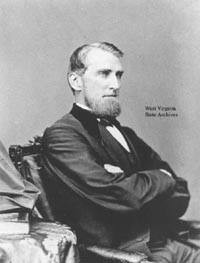



|
On May 29, 1862, Senator Waitman T. Willey presented a formal petition to the United States
Senate for the admission of West Virginia to the Union. Willey's petition was referred to the
Committee on Territories. Senator John Carlile, who was a member of the committee, was
assigned the task of writing the statehood bill. On June 23, Benjamin Wade, who chaired the
Committee on Territories, reported the bill to the Senate. Carlile had added fifteen counties,
provided for gradual emancipation, and required a new constitutional convention. West
Virginians, including his fellow senator, were stunned by Carlile's apparent change of heart
regarding statehood.
When the bill was introduced, Senator Charles Sumner of Massachusetts called for an amendment requiring the emancipation of all slaves in West Virginia on July 4, 1863, but his proposal was defeated. Senator Willey then offered a substitute that called for the admission of West Virginia upon approval of gradual emancipation by the constitutional convention. Eventually, a compromise agreement resulted in the Willey Amendment, which provided for gradual emancipation. On July 14, 1862, both the Willey Amendment and the West Virginia statehood bill passed by a vote of 23-17. |
 |
